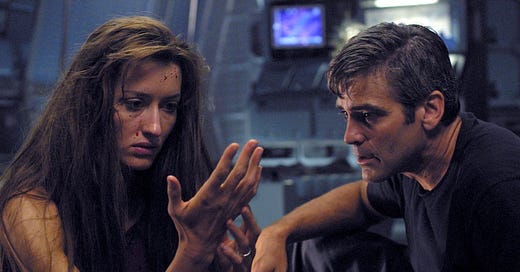Heroes of the Zeroes: Solaris (2002)
Heroes of the Zeroes is a daily, alphabetical look back at the 365 best films of 2000-2009.
"Solaris" Rated PG-13 2002
“I’m haunted by the idea I remembered her wrong.”
It’s an unsettling utterance in 2002’s “Solaris” — spoken by Chris Kelvin (George Clooney), a psychologist emotionally unmoored after the death of his wife, Rheya (Natasha McElhone), and unnerved by her nightly resurrection on a space station orbiting the enigmatic planet Solaris.
Chris’s fear is that of any spouse who doesn’t go first — time and absence thieving the memory and essence of someone to whom enduring love was pledged. These fragmented recollections frighten Chris on Earth, but they become terrifying once Solaris turns Chris’s half-formed mental representations of Rheya into breathing beings.
Though still easily accessible, “Solaris” is a challenging film of chilling, cloistered intimacy — a man considering a second chance with something that’s half his wife. It couldn’t possibly live up to promotional promises of producer James Cameron’s spectacle or writer-director Steven Soderbergh’s scope, thus its box-office flameout.
If “Solaris” shares anything with a Cameron production, it’s the relentless claustrophobia of “Aliens” — here applied to Chris’s crumbling psyche via Clooney’s jittery, guilt-addled performance and a Dylan Thomas poem motif.
Though convincingly mounted, “Solaris” concerned itself with neither visual effects nor clumsily explanations of Solaris’s powers. (“Why do you think it has to want something?,” one character asks of Chris’s quest for answers and rationale.)
Instead, Soderbergh pruned Andrei Tartovsky’s 1972 film (based on Stanislaw Lem’s novel) to the clarity and concision of a great short story — a forlorn, philosophical sci-fi romance treading the terrain of “Blade Runner’s” metaphysical melancholy.



